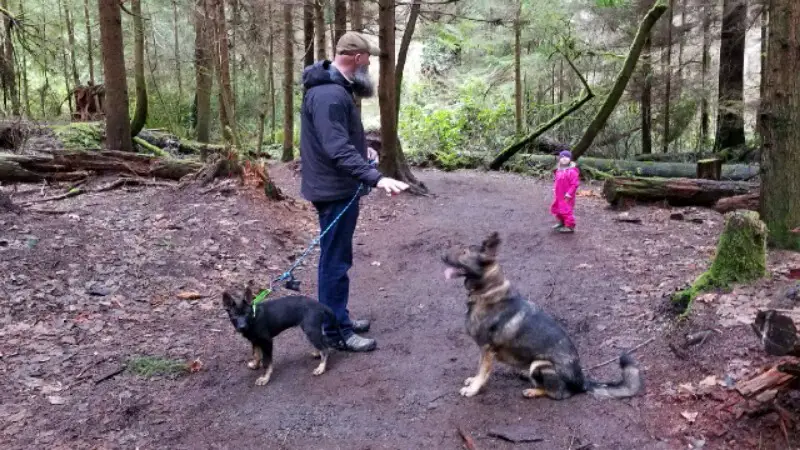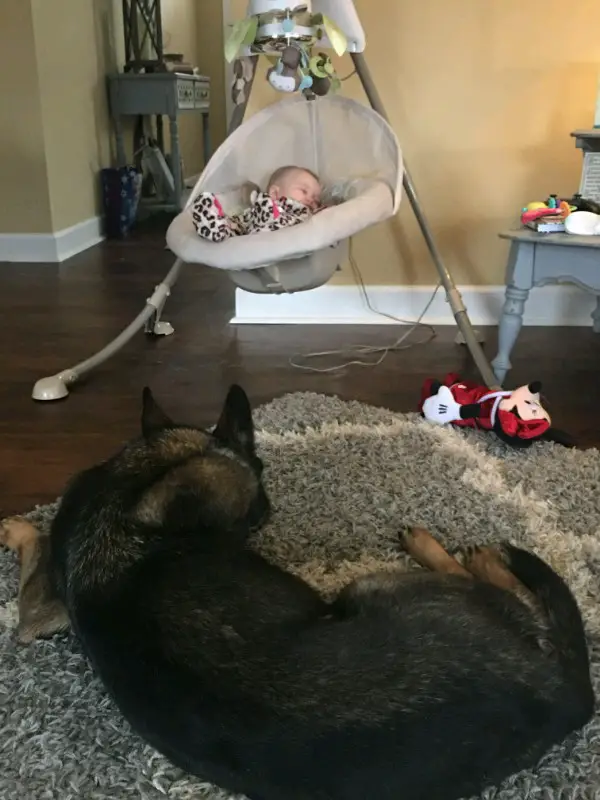
This is a placeholder text
Group text
by joanro on 16 April 2018 - 00:04
Here is another female from me, lives with a family in central USA. Her dam is Wallace's granddam.
This female was not raised with children. I rescued her from a very bad situation, rehabilitated her, had her spayed and at two years old, placed her with this family....she took to this newborn the day the baby came home, chose to sleep in the baby's nursery and keeps guard....no one but family are allowed to enter.
by yogidog on 16 April 2018 - 07:04
by 2Cats on 16 April 2018 - 10:04
Old school dogs, was never socialized, as they were property/family protection and socializing was not something you did. Yet they never went ape over another dog they see or don't know, it was more like a respectful node between the two, kinda like a "yo, what's up?'' and moved a long.
As with children, my parents had a daycare, the dogs loved every child that walked into our property like they were part of our family, My parents always told the new prospective daycare childrens families that when they come for the interview, EVERYONE that is going to be dropping off or picking up the child MUST be present on that day so the dogs can meet them. The families always took it as a joke, but when one of the children's grandfather ( never been there before) came to pick up the kids, the dogs let him in the gate and immediately cornered him, while one was guarding the kids playing outside, holding him till my mom came out, and asked who he is...ofcourse she had to verify with the parents. they do not let you go until my mom or dad said "they are welcome, and they are so and so's family"
Yet our dogs never had any formal training but knew what to do and how to react.
They also never got bloat, you never heard of any shepherd having had bloat...
I have noticed that there are still some Old school shepherds in South Africa, mostly people who do not know what they have, as to them it's a dog...My sister called a few days ago, showed me a photo of a showline litter for sale(South Africa), she was smitten with the red coats and black saddle, I told her that the coat is mostly due to carotene, as all show owners know makes them a lot redder...
Well, after an hour on the phone, explaining all the health issues, what she needs to ask the breeder, tests that the breeder should have done before breeding and sending her our "puppy guide and hip care" booklet...she is no longer interested. I could have send her a pup, but with the stupid quarantine the dog might never end up with her...( that is a whole nother story)
I don't see the Shepherd getting better or back to where they were. In a few years when we are ready for a new dog, Hopefully Joandro is still breeding.
My husband has his heart set on a Russian terrier, never had one, never even met one, so I am not so keen.
by Gustav on 16 April 2018 - 11:04
by joanro on 16 April 2018 - 12:04
Here is a pup from me ( littermate to the pup in the wagon with baby) the morning after 18 hours in transit, arriving in the north west...the grown female is a five year old they got as a puppy from me, who is a littermate to the female lying down in front of the baby in the suspended seat. She is a therapy dog for a war veteran, gets exersise on walks with these original owners.
The pup is going to be raised to work as a dual purpose dog for security company with his owner...but primarily a family dog and protector for his family. Remember, he just met his 3 year old little girl and owner/handler and Reride (the adult female), after 18 hrs in transit.

_resized-600x1067.jpg)
by joanro on 16 April 2018 - 12:04
Another one from me, her sire is littermate to Wallace's dam.
https://www.dropbox.com/s/adunqwucx5r35co/IMG_2560.MOV?dl=
Here's Wallace ( aka Bruno) as one year old with his little girl...
https://www.dropbox.com/s/cr6oiko9oidv4bx/IMG_5998.MOV?dl=0
by Sunsilver on 16 April 2018 - 14:04
Never did get that Sch 3...
But that's just the one dog. I know better than to generalize and say they are ALL like that.
Joan knows her stuff, and I'd definitely recommend her as a breeder.
If you don't want to wait for one of her pups, Gustav may be able to point you in the right direction. He's been training GSDs for real work longer than most of us have been alive.
by Mindhunt on 16 April 2018 - 15:04
I agree, I see far too many dogs that look like they got smacked in the butt and haven't gotten over the trauma so they drag their butts and do this weird paddling run. They are just a sad representation.
My first GSD was of German working stock and had that big block head and straight back, calm nerves, hard worker, good drive (not insane), and mindblowingly intelligent. He did what we called "threat recognition and assessment." We could tell him to bite someone until the cows came home, if he did not think that person was a threat, he would laugh (I swear he laughed). If he felt someone was a threat, he would slowly escalate from standing between me and the "threat" with his patented stare and then square up, then low growl, then show teeth, you get the picture. He NEVER overreacted and never underreacted. He was amazing, unfortunately he was taken too soon by DM. My others are great as well, ranging in age from 3 years old to 15 years old.
by Jenni78 on 16 April 2018 - 20:04
2Cats, I am more along Joan's side of things- I don't think what you're asking is hard to find. I think those who complain it is just don't know where to look ;) I have OFTEN heard the black and reds compared to children with ADHD from those who own them. They were told working lines were too much dog for them and so they got a show line. What they got was a dog with nervous, hectic energy, lack of focus, and an inability to settle, rather than "high drive." I don't know who told these breeders that "drive" means "scrape the hectic dog off the wall multiple times daily" but I'd love the opportunity to wring their neck. DRIVE is not the issue. NERVES are the issue- the ability to cap oneself is key. Discernment is key. Innate ability to judge threat from non-threat. You can have all of these things in a dog with high aggression and high drive, so long as the nerves are there.
A lack of aggression in the breed is no more correct than hocks resting on the ground at a stand. Inappropriate aggression is the problem, and that again comes back to nerves. 2Cats, you might like this girl I picked up recently- I describe her as "old school" and not just in looks. If I invited you to my home, you would see her on the couch and I could likely convince you she is just a pet and has no drive. She's kind, mild-mannered indoors, calmly snoozes on the couch when I'm busy elsewhere, and is physically what you're speaking of. Outdoors, however, you wouldn't believe she's the same animal. EXTREME drive. I am not a proponent of breeding for extremes, except extreme versatility and stability, her extreme drive creates no issues because she has the nerves, ability to control herself, and the discernment needed to make her a pleasure to live with as opposed to a nightmare.
http://www.pedigreedatabase.com/german_shepherd_dog/dog.html?id=2732428-jenagers-lani
I have bred for that temperament and succeeded, but my point here is that there are still others doing the same and these dogs are just not that impossible to find. Look at all Joan posted. To us, that's the norm, the standard, not the exception.
by susie on 16 April 2018 - 21:04
It's not about "old school", it's about well bred GSDs, always has been, and you are able to find them in show lines and in working lines.
Everything boils down to the parents - their temperament, their character, and their environment.
Afterwards the question: which puppy did inherit the genes I am looking for?
Try to meet as many dogs as possible ( clubs, trials, shows, whatever possible ) ; write down the males/females you like, remember the breeders, ask for litters, and - most important- ask if you are allowed to pick "your" pup by yourself...
And, please, don't compare a puppy with a dog born and death decades ago - every dog is an individuum, you will never ever get the incarnation of your childhood again - you are an adult now, and whatever dog you get it's your responsibility to raise and train this dog according to your needs.
This special dog you remember and still love was raised and trained ( educated ) by your parents, they seem to have done a pretty good job - genetics always do play a role, but the follow up is the responsibility of the owner.
Contact information Disclaimer Privacy Statement Copyright Information Terms of Service Cookie policy ↑ Back to top





